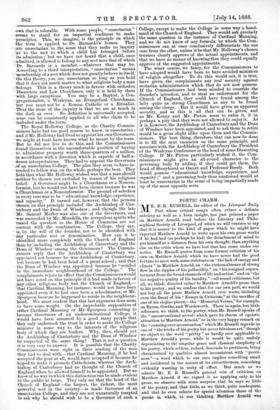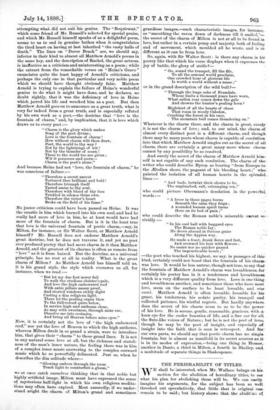POETIC CHARM.
MR. E. R. RUSSELL, the editor of the Liverpool Daily Post, whose critical essays often evince a delicate subtlety as well as a keen insight, has just printed a paper on Matthew Arnold, read before the Literary and Philo- sophical Society of Liverpool, of which we will venture to say that it is nearer to the kind of paper which we might have expected Matthew Arnold to write upon his own prose works if he had had (as perhaps he had) the detachment of mind to put himself at a distance from his own thought, than anything else on the critic whom we have lost that has come under our notice. Mr. Russell quotes from some former criticism of his own on Matthew Arnold, which we have never had the good fortune to meet with, some strictures on "the lack of energy and climax" in Matthew Arnold, on "the curious absence of strong flow in the ripples of his pellucidity," on "his resigned segues- terment from the broad channels of life and action," and on "the too negative quality of his lucidity,"—all sound criticisms, but all, we think, directed rather to Matthew Arnold's prose than to his poetry ; and we confess that, for our own part, we would not buy all the prose Mathew Arnold ever wrote, including even the finest of his "Essays in Criticism," at the sacrifice of one of his elegiac pieces,—the "Memorial Verses," for example, on Byron, Goethe, and Wordsworth. There is, again, but little reference, we think, to the poetry, when Mr. Russell speaks of the "unconventional naiveté which gave its charm of egoistic attraction to Matthew Arnold," or in the very happy remark on the "cunning over-accentuation" which Mr. Russell regards as one of "the tricks of his pretty but never frivolous art," though we object to the word " pretty " as hardly ever applicable to Matthew Arnold's prose, while it would be quite unduly depreciating to the singular grace and classical simplicity of his poetry, which seldom, indeed, descends to prettiness, being characterised by qualities almost inconsistent with " pretti- ness,"—a word which to our ears implies something small and accidental in the nature of its attractiveness, something evidently wanting in unity of effect. But much as we admire Mr. E. R. Russell's general vein of criticism on Matthew Arnold, if we regard it as applying only to his prose, we observe with some surprise that he says so little of his poetry, and that little, as we think, quite inadequate, and that he even selects for special attention those of the poems in which, to our thinking, Matthew Arnold was
attempting what did not suit his genius. The "Requiescat," which some friend of Mr. Russell's selected for special praise, and which Mr. Russell himself speaks of as a delightful poem, seems to us to end in genuine bathos when it congratulates OA tired heart on having at last inherited "the vasty halls of death." The lines on "Dover Beach" are, we should say, inferior in their kind to almost all Matthew Arnold's poems in the same key, and the description of Rachel, the great actress, is ineffective as a criticism and uninteresting as a poem ; while the extract from the remarkable verses on " Heine's Grave" enunciates quite the least happy of Arnold's criticisms, an4 perhaps the only one in that particular and very noble poem which we should have thought obviously false. Matthew Arnold is trying to explain the failure of Heine's wonderful genius to do what it might have done, and he declares, no doubt rightly, that it was the deficiency of love in Heine which jarred his life and wrecked him as a poet. But then Matthew Arnold goes on to announce as a great truth, what is very far indeed from a great truth, and is especially refuted by his own work as a poet,—the doctrine that "love is the fountain of charm," and, by implication, that it is love which draws us to every poet :—
"Charm is the glory which makes Song of the poet divine ; Love is the fountain of charm ! How without charm wilt thou draw, Poet, the world to thy way ? Not by the lightnings of wit ! Not by the thunder of scorn ! These to the world too are given ; Wit it possesses and scorn— Charm is the poet's alone."
And because Heine had not "love, the fountain of charm," he was conscious of failure :—
" Therefore a secret unrest
Tortured thee brilliant and bold ! Therefore triumph itself Tasted amiss to thy soul.
Therefore with blood of thy foes Trickled in silence thine own. Therefore the victor's heart Broke on the field of his fame."
No juster criticism could have been passed on Heine. It was the caustic in him which burned into his own soul, and had he really had more of love in him, he at least would have had niore of the fountain of charm. But is it in the least true that love is the universal fountain of poetic charm,—say, in Milton, for instance, or Sir Walter Scott, or Matthew Arnold himself? Mr. Russell does not endorse Matthew Arnold's great doctrine, but he does not traverse it, and yet no poet ever produced poetry that had more charm in it than Matthew Arnold, and the greatest of its charms is often as remote from "love" as it is from hatred. But the doctrine, as a universal principle, has no root at all in reality. What is the great charm of Milton? As Matthew Arnold has himself told us, it is his grand style, the style which overawes us all, for instance, when we read :— "But let my due feet never fail To walk the studious cloister's pale, And love the high embowered roof With antic pillars massy proof, And storied windows richly dight Casting a dim religious light.
• There let the pealing organ blow To the full-voiced quire below, In service high and anthems clear, As may with sweetness, through mine ear, Dissolve me into ecstasies,
And bring all Heaven before mine eyes."
Now, it is certainly not the love of "the high embowered roof," nor yet the love of Heaven to which the high anthems, whereon Milton dwelt in so grand a strain, were to introduce
him, that gives their "charm " to these grand lines. It is not in any natural sense love at all, but the richness and stateli- ness of the man's inner nature, the feeling there was in him of a complex inner music answering to the complex outward music which he so powerfully delineated. Just so, when he describes the dim solitude where—
"Glowing embers through the room
Teach light to counterfeit a. gloom,"
we at once catch ourselves thinking that in that noble but highly artificial image, Milton must have expressed the sense of mysterious half-light in which his own religious medita-
tions may often have expired. Most assuredly; if we under- stand aright the charm of Milton's grand and sometimes
"A fever in these pages burns Beneath the calm they feign ; A wounded human spirit turns Here on its bed of pain ;"
who could describe the Roman noble's miserable unrest so - • vividly :— " In his cool hall with haggard eyes The Boman noble lay;
He drove abroad in furious guise Along the Appian way.
He made a feast, drank fierce and fast, And crowned his hair with flowers : No easier nor no quicker passed The impracticable hours ;"
—the poet who touched his highest, we say, in passages of this certainly could not boast that the fountain of his charm ,
was love. It would be less untrue, though not true, to say tha,t the fountain of Matthew Arnold's charm was loveableness, for certainly his poetry has in it a tenderness and loveableneee
which is a very different quality from love. Love is one thing and loveableness another, and sometimes those who have most
love, seem on the surface to be least loveable, and viol versii. Matthew Arnold is often loveable, loveable for his
grace, his tenderness, his sedate purity, his tranquil and collected patience, his wistful regrets. But hardly anywhere does the secret of his charm seem to us to be the power
of his love. He is serene, gentle, reasonable, gracious, with a. keen eye for the cooler beauties of life, and a fine ear for all the flute-like voices of Nature ; but he is not the poet of lov,ei though he may be the poet of insight, and especially ;ot insight into the faith that is seen in retrospect. And kr
our own parts, we should say that poetic charm has no single fountain, but is almost as manifold in its secret sources as is in its modes of expression,—being one thing in Homer, another in Dante, a third in Milton, a fourth in Shelley, and, a multitude of separate things in Shakespeare. grandiose images,—such characteristic images, for instance, as "smoothing the raven down of darkness till it smiled,"— the secret of the charm of Milton is not at all to be found in love, but rather in a certain pomp and majesty, both of feeling and of movement, which moulded all he wrote, and is a's different as it can be from love.
So, again, with Sir Walter Scott : is there any charm in hit poetry like that which his verse displays when it expresses the joy of battle, the glory of strife P--
" Go, sound the trumpet, fill the Me, To all the sensual world proclaim, One crowded hour of glorious life Is worth a world without a name ;"
or in the grand description of the wild bull ?—
" Through the huge oaks of Evandale, Whose limbs a thousand years have worn, What sullen roar comes down the gale And drowns the hunter's pealing horn ?
Mightiest of all the beasts of chase That roam in woody Caledon, Crashing the forest in his race,
The mountain bull comes thundering on."
Whatever is the charm there, and the charm is great, surely it is not the charm of love ; and, to our mind, the charm of almost every distinct poet is a different charm, and though there may be many poets whose charm is capable of tesolution
into that which Matthew Arnold singles out as the secret of all charm, there are certainly a great many more whose charm cannot by any possibility be so resolved.
And surely the secret of the charm of Matthew Arnold him- self is not capable of any such resolution. The charm of the writer who could describe Byron as bearing "from Europe-to the .LEtolian shore, the pageant of his bleeding heart ;" who: painted the isolation of all human hearts in the splendid., lines :—
" And bade, betwixt their shores to be, The unplumbed, salt, estranging sea
who could picture Oberraann's desolation in the powerbil words :--



































 Previous page
Previous page